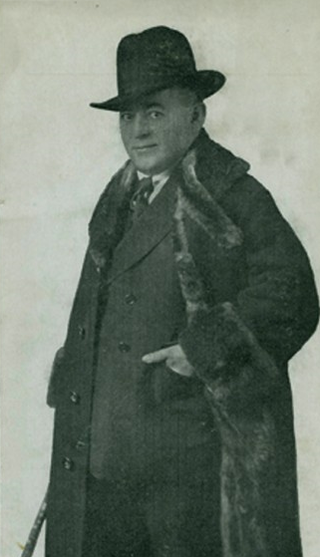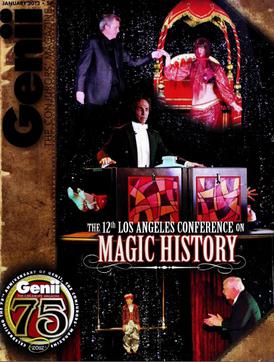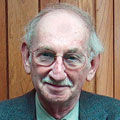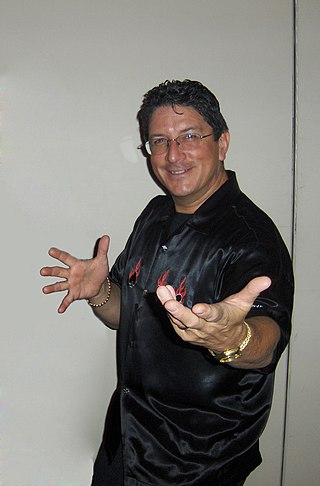
Coin magic is the manipulating of coins to entertain audiences. Because coins are small, most coin tricks are considered close-up magic or table magic, as the audience must be close to the performer to see the effects. Though stage conjurers generally do not use coin effects, coin magic is sometimes performed onstage using large coins. In a different type of performance setting, a close-up coin magician will use a large video projector so the audience can see the magic on a big screen. Coin magic is generally considered harder to master than other close-up techniques such as card magic, as it requires great skill and grace to perform convincingly, and this requires much practice to acquire.

Michael Ammar is an American close-up magician.

David Frederick Wingfield Verner, better known by his stage names Dai Vernon or The Professor, was a Canadian magician.

Tony Slydini, simply known as Slydini, was a world-renowned magician. His mastery, expertise, originality and innovative approach to close-up artistry magic, earned him a legendary reputation in the magic world. He traveled the world performing for the public as well as performing and lecturing fellow magicians. As a result, he served as an inspiration to generations of well-known magicians, celebrities and entertainers, including Doug Henning, Dick Cavett, Bill Bixby, Ricky Jay, David Copperfield and countless others. Although he was best known as a master of close-up artistry, he continually demonstrated an extraordinary performing ability and during his lifetime was responsible for a long series of books, films and publications highlighting his mastery of the magical crafts. For his work, he received the highest honors that his profession could bestow, including both the coveted Masters Fellowship Award and Performing Fellowship Award from the Academy of Magical Arts. During his lifetime, Tony Slydini was inducted into the Society of American Magicians Hall of Fame as a Living Legend.

Max Malini was a magician who at his peak performed for several US Presidents and at Buckingham Palace, receiving gifts from monarchs across Europe and Asia. Many magicians, such as Dai Vernon and Ricky Jay, have held him in high esteem for his skill and bold accomplishments.
Channing Pollock was an American magician and film actor.

David Roth was an American magician widely regarded as one of the world's greatest coin magicians. Roth was an important contributor to Richard Kaufman's Coinmagic, an influential text on contemporary coin technique; his major work was chronicled in David Roth's Expert Coin Magic, a book written by Richard Kaufman. Roth was associated with Fantasma Magic, a magic manufacturing and retail company in New York City before going to work for the Conjuring Arts Research Center during the last decade of his life.

Daniel Sylvester Battagline, also known as Sylvester The Jester, is an American magician, best known for playing a cartoon character who comes to life. He has had hundreds of stage and television appearances, including NBC’s "World's Wildest Magic," ABC’s "Champions of Magic III", Jerry Lewis's Muscular Dystrophy Telethon and The Discovery Channel’s "More Science of Magic." He has performed in multiple Las Vegas shows including opening for The Amazing Johnathan, and appearing at Caesar’s Magical Empire. He also produces a series of magic products, and has been credited with creating the illustrations for various magic publications, such as the cover for The Amazing Johnathan's Every Trick in the Book, and the poster for John Carney's "Mr. Mysto" act. In 1996, he also created a prop for the television show, "Sabrina, the Teenage Witch." He has been featured on the cover of several magic and culture-related magazines, such as the September 1998 issue of Magic.

Genii, The Conjurors' Magazine is a magazine devoted to magic and magicians. It is a monthly magazine first published in September 1936, currently edited by Richard J. Kaufman and owned by Randy Pitchford. The magazine is based in Washington, DC.

David Berglas was a German-born British magician and mentalist. His secret technique of locating a particular card within a pack has been described as the Holy Grail of card magic. He was one of the first magicians to appear on UK television.

Herbert Gershen Zarrow was an American magician influential in the profession for his inventions of unique sleight of hand and card tricks. The inventor of the Zarrow shuffle, his skills were held in the highest regard in professional magicians' circles.

Daryl Easton, known professionally as Daryl and born Daryl Martinez, was an American magician based in Las Vegas. In his marketing he used the self-proclaimed title of "The Magician's Magician". Daryl usually went by his forename only.
Brother John Charles Hamman S.M. was a close-up magician and Marianist Brother. The tricks he invented are still an integral part of many close-up magician's repertoire. Hamman was world-renowned in the magic community. His initial interest in the art started as a child. As he recuperated from polio, he spent hours learning, practicing and inventing card tricks and other magic involving sleight-of-hand. In many cases, he "reinvented" classic maneuvers or streamlined them. He was a member of the International Brotherhood of Magicians, the Catholic Magicians' Guild and the Society of American Magicians.

Chink-a-chink is a simple close-up magic coin trick in which a variety of small objects, usually four, appear to magically transport themselves from location to location when covered by the performer's hands, until the items end up gathered together in the same place. Variations, especially the Sympathetic Coins, also known as Coins-n-Cards, have been performed since the 1800s. Popular modern variations are Shadow Coins and Matrix. A variation using playing cards as the objects is known as Sympathetic Aces.
Dell O'Dell was the stage name of Odella Newton an American magician regarded in her profession as a pioneer who provided a role model for modern female performers. She was noted for being one of the first magicians to appear on television, on her own show, The Dell O'Dell Show, on ABC's local station in Los Angeles in 1951. She was also one of few American women to have her own circus, the Della O'Dell Society Circus, which toured the Midwest in 1925 and 1926. Before becoming one of the most popular female magicians on the night club circuit during the 1930s, 40s, and 50s, Dell O'Dell also performed in vaudeville and burlesque. Her skills included juggling furniture and lecturing on physical culture.
Karl Fulves was a magician and author and editor of publications on magic, including the Pallbearers Review, a series of books on sleight of hand and close-up magic.

The Magic Castle is a clubhouse for the Academy of Magical Arts and for magicians and magic enthusiasts. The Academy was started in 1952 by William Larsen Sr., who founded Genii magazine in 1936. The Castle was opened on January 2, 1963 by brothers Bill and Milt Larsen, sons of William Sr and Bill's wife Irene Larsen.

Richard J. Kaufman is an author, publisher, illustrator, and editor of books and magazines in the field of magic and amateur magicians of noted skill.

Lawrence Grey was an English magician known for his card tricks. He also worked as an occasional actor and is known for voicing Bill the Lizard in Walt Disney's Alice in Wonderland.

Bruce Cervon was an American magician who was best known for his close-up magic, both through performance and invention. He published a series of books and helped to create a permanent record of the magic of Dai Vernon through The Vernon Chronicles, and Bruce Cervon's Castle Notebooks.















